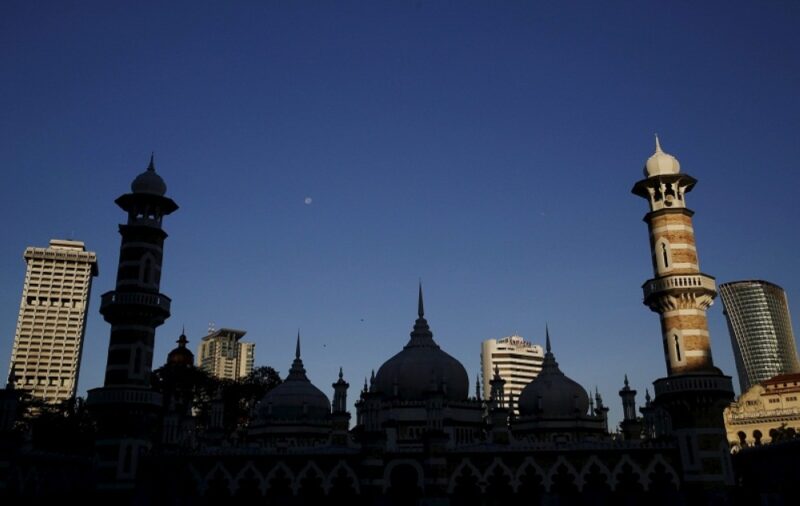KUALA LUMPUR, Oct 22 — The High Court earlier this month rejected the Perlis Islamic council’s bid to get common entry to Hindu mom Loh Siew Hong’s three youngsters — who have been unilaterally transformed by their Muslim convert father — to give them Islamic lessons and take them to the mosque.
Why did the Perlis Islamic Religious and Malay Customs Council (MAIPs) ask for entry, together with entry to their home to supervise Loh to be sure that her three youngsters are raised in a conducive surroundings in accordance to Islam.
How was MAIPs’s court utility made? Why did the High Court say no to such an utility and what have been the legal guidelines concerned? What do the three youngsters really need?
Here’s a abstract of the 41-page High Court judgment as sighted by eNews Malaysia:
Advertisement
What occurred earlier than this
Both Loh and her then-Hindu husband married in a civil marriage in 2008, with their three youngsters born in Kedah.
Loh said there was home violence by her then-husband as early as 2017, and that she had to be hospitalised in March 2019 due to accidents from her husband’s assault. Since then, she had no entry to her youngsters and in October 2019 filed for divorce.
Advertisement
While the divorce proceedings have been nonetheless ongoing, the husband on July 7, 2020 transformed each himself and the youngsters to Islam — with out Loh’s data and consent — in Perlis. At that point, the dual daughters have been aged 11 whereas the son was 9 years outdated.
While the High Court on March 31, 2021 granted Loh the only guardianship, custody, care and management of her three youngsters as a part of the divorce (Note: that is the custody order that MAIPs later needed to change), she didn’t know the place they have been and was saved separated from them for about three years from 2019 till 2022.
After Loh lastly reunited along with her youngsters on February 21, 2022 following a High Court order for them to be returned to her, MAIPs on March 7, 2022 utilized to intervene or be a part of Loh’s divorce case so as to ask for modifications to the custody order.
MAIPs initially failed to be an intervener when the High Court (Family Division) on June 15, 2022 dismissed its bid, however later succeeded in its February 7, 2023 attraction on the Court of Appeal and was allowed to intervene.
MAIPs on February 17, 2023 then utilized to the High Court (Family Division) to ask the court to differ or make modifications to the custody order. At this time limit, Loh had been reunited along with her youngsters for simply practically a yr.
This MAIPs utility was heard earlier than a distinct High Court decide, and that is the appliance which was rejected this month.
MAIPs needed to take Loh’s son to a mosque inside 10 kilometres of his home for Friday prayers, and to convey all three youngsters to rejoice main Islamic events at any mosque, surau or authorities venue inside 10 kilometres of their home. — eNM pic
What did MAIPs need to change within the court order?
In its utility, MAIPs needed the court to add orders to the custody order (which gave Loh sole custody of her three youngsters).
Among an extended record of things, MAIPs needed to get supervised entry to the youngsters so as to give them two hours of primary Islamic lessons each two weeks, describing them as “kanak-kanak muallaf” or youngster converts.
MAIPs needed to take Loh’s son to a mosque inside 10 kilometres of his home for Friday prayers, and to convey all three youngsters to rejoice main Islamic events at any mosque, surau or authorities venue inside 10 kilometres of their home.
MAIPs needed to get entry to give monetary and schooling assist to the youngsters, and to give monetary assist to Loh for elevating them.
MAIPs additionally needed to be given entry — together with getting into Loh’s home — for up to one hour each three months, to supervise and information her on elevating her youngsters in a conducive surroundings in accordance to “syarak” or Islamic legal guidelines (together with however not restricted to the consuming of halal meals).
What did the High Court resolve?
Family Court decide Hayatul Akmal Abdul Aziz on September 27 heard MAIPs’s utility to achieve entry to Loh’s three youngsters and even interviewed the youngsters privately, earlier than deciding on October 11 to dismiss MAIPs’s utility.
Here are the legal guidelines concerned on this case:
Under the Law Reform (Marriage and Divorce) Act 1976’s Section 88, the court has the ability to make an order for a kid’s custody: to be positioned below the daddy; or mom; or (if there are distinctive circumstances making it undesirable for the kid to be entrusted to both dad or mum) to a relative or to an affiliation whose goal contains youngster welfare or to some other appropriate particular person.
Section 88 requires the kid’s welfare to be the court’s “paramount consideration” when deciding on the kid’s custody, with the court to contemplate the dad and mom’ needs and the kid’s needs if the kid is sufficiently old to categorical an unbiased opinion.
This means the kid’s welfare have to be the overriding consideration or crucial issue.
Under the identical regulation’s Section 96, the court has the powers to differ custody orders when “any particular person” applies for it, and the court can differ the court order at any time if the court is happy that there’s one in all these conditions: the custody order was based mostly on misrepresentation or mistake of truth; or when there was any “materials change within the circumstances”.
MAIPs advised the court that its utility below Section 96 to differ the custody order — to achieve entry to Loh’s three youngsters — relies on the alleged “materials change in circumstances” when the trio have been transformed to Islam.
The brief reply to why MAIPs failed in its utility: The High Court discovered that there was no materials change in circumstances and due to this fact dismissed the appliance to differ the custody order on Loh’s three youngsters. (Remember, below Section 96, there have to be a fabric change of circumstances earlier than the court can differ a custody order.)
An aerial view of the Kuala Lumpur High Court April 23, 2020. — Picture by Hari Anggara
Here’s the longer rationalization:
First of all, decide Hayatul Akmal made it clear that the unilateral conversion of the three youngsters is a separate case at present awaiting listening to on the Court of Appeal, and that Loh’s ex-husband’s earlier utility to keep and differ the March 31, 2021 upkeep order — the place he initially had to pay RM3,000 for the youngsters’s upkeep — can be a separate case earlier than one other High Court decide.
For the separate upkeep matter, the High Court final month reportedly dismissed the ex-husband’s bid to keep the upkeep order, however lowered the upkeep quantity he had to pay to RM600 monthly.
Loh didn’t object to the decrease upkeep quantity and argued that MAIPs can not compel her to settle for their monetary assist in caring for her youngsters, additionally arguing that MAIPs might channel assist by paying the ex-husband to allow him to pay for the youngsters’s upkeep if the Islamic council was genuinely to help financially.
As for the unilateral conversion matter, the High Court on May 11 dismissed Loh’s problem, and the Court of Appeal is scheduled to hear her attraction on January 10 subsequent yr.
In different phrases, Loh remains to be pursuing the court problem on the legality of her youngsters’s conversion, and their non secular standing in official information remains to be being disputed within the courts.
Those two circumstances together with the unilateral conversion problem are separate issues, and the High Court solely had to resolve on MAIPs’s utility for entry to the youngsters based mostly on whether or not there was materials change in circumstances.
But Hayatul Akmal said she had touched on overlapping points out of necessity, making it clear that her judgment shouldn’t be seen as interfering with or deciding on these overlapping points in these two separate circumstances.
Both MAIPs and Loh had raised points just like the unilateral conversion through the listening to on MAIPs’s bid to get entry to the youngsters, and the decide was addressing the factors that they’d raised.
Among different issues, MAIPs cited the Perlis state regulation Administration of the Religion of Islam Enactment 2006’s Section 117(b). Section 117(b) initially required the consent of “ibu dan bapa” (each dad and mom) for youngsters or these aged beneath 18 to convert to Islam, however Perlis amended it in 2016 to permit the conversion of kids if there may be consent from “ibu atau bapa” (mom or father).
Besides the 2016 model of Section 117(b) permitting unilateral conversion in Perlis, MAIPs additionally cited the Federal Court’s December 2007 determination within the case involving Hindu mom R. Subashini and her Hindu-turned-Muslim husband who had transformed their elder youngster to Islam. The 2007 court determination had interpreted the Federal Constitution’s Article 12(4) to say {that a} youngster’s religion may be determined by one dad or mum.
MAIPs had argued that the three youngsters’s conversion to Islam remained authorized and legitimate, and claimed that it has the statutory accountability below the identical 2006 Perlis state regulation to present steerage and instruction on Islam to them and to guarantee their welfare. MAIPs claimed it has the accountability of appearing as “in loco parentis” or instead of the three youngsters’s dad and mom by way of Islamic schooling.
In objecting to MAIPs’s utility, Loh had argued that the youngsters’s unilateral conversion was unlawful, based mostly on the Article 12(4) interpretation within the Federal Court’s 2018 determination within the case of Hindu mom M. Indira Gandhi and her Muslim convert ex-husband who unilaterally transformed their youngsters to Islam.
In Indira’s case, the Federal Court dominated that consent of each dad and mom is required for the non secular conversion of kids.
The Indira Gandhi determination remains to be the regulation of the day
While MAIPs cited the 2007 determination in Subashini’s case, the High Court said the Federal Court’s 2018 determination in Indira’s case “is the regulation of the day on unilateral conversion of underage youngsters” and that the courts are nonetheless certain by this precedent.
“In the premise, the consent of each dad and mom is required for the conversion of the said youngsters. MAIPs can not ignore or refuse to adjust to the authorized place established in Indira Gandhi’s case, that’s the authorized place that binds the courts and events subordinate to it.
“That place stays unchanged till it’s revisited and adjusted by the apex court,” the decide said, having famous nevertheless that the validity of Loh’s three youngsters’s conversion certificates remains to be a matter earlier than the Court of Appeal and that she was merely addressing MAIPs’s arguments on this case.
The High Court said the 2007 determination cited by MAIPs had been outdated by the 2018 determination in Indira’s case, noting that when there are two conflicting choices from the Federal Court, all lowers courts should observe the newest determination because it represents the prevailing state of the regulation and prevails over the sooner determination.
The Federal Court’s 2018 determination in Indira’s case was utilized by the Court of Appeal in 2021 in a unilateral conversion case involving a Buddhist father and a Buddhist-turned-Muslim mom, with the Federal Court in April 2022 additionally citing the Indira determination in the identical case.

Loh Siew Hong speaks to reporters after court determination at Kuala Lumpur High Court in Kuala Lumpur October 11, 2023. — Picture by Firdaus Latif
Children’s pursuits are paramount consideration; what the youngsters wished for
The High Court said it couldn’t settle for MAIPs’s misplaced and “simplistic argument” that for the reason that father was a Hindu and had transformed to Islam, that it was solely acceptable that the youngsters who have been additionally Hindus observe within the father’s footsteps and embrace Islam, stating: “Indeed, there may be no compulsion in issues of religion.”
The decide additionally said MAIPs’s proposed entry is “intrusive and never within the youngsters’s greatest curiosity”, including that the court order granting sole custody to Loh means she has the authority to resolve her youngsters’s day-to-day affairs except she had acted in any manner that may be unfavorable to their welfare.
The court said there was no compelling proof to present Loh had acted in such a manner.
The decide additionally disagreed with MAIPs’s request to get bodily entry into Loh’s house for one hour each three months to monitor and supervise her in elevating her youngsters, stating: “Not solely is it intrusive and an invasion of her privateness, however additionally it is disrespectful to her at no fault on her half. That is just going too far over a matter that it has no authority.”
The decide said Loh’s place — that she and the youngsters don’t want any assist from MAIPs — has to be revered.
Agreeing with Loh that it’s the ex-husband who has a authorized obligation on the youngsters’s welfare as a substitute of MAIPs, the decide said the 2006 Perlis state regulation cited by MAIPs doesn’t help the Islamic council’s declare that it might act as “in loco parentis” or instead of the three youngsters’s dad or mum.
The decide said whether or not the three youngsters need to stay as Muslims is just not an element for the High Court to contemplate when deciding whether or not to differ the custody order.
A college boy walks previous a avenue mural depicting a college bus and college students in Shah Alam, January 2, 2014. — eNM pic
Citing the regulation and previous court choices, the decide harassed that the pursuits and welfare of the kid is the “paramount consideration” in deciding on youngster custody, however said the court can contemplate the desires of the dad and mom and the youngsters.
With no objections from all events and with MAIPs’s lead lawyer saying it will be honest for the decide to interview the three youngsters to get an entire image, the decide had on September 27 interviewed every of them individually in her chambers. The twins can be 15 this yr, whereas the boy is aged 12.
The decide said the three youngsters had superb command of the Malay language — which they selected to be interviewed in — and will perceive her questions clearly and will voice their opinions very effectively.
Based on the separate interviews which she had began by reminding them to inform the reality as it will be for his or her profit and wellbeing, the Family Court decide said the three youngsters “expressly objected” to MAIPs’s utility to get supervised entry to them.
“They don’t want MAIPs to have entry,” the decide said concerning the three youngsters’s views, including that they said they have been afraid of the daddy who had allegedly later grow to be abusive.
After being separated from their mom for nearly three years and being reunited to reside along with her in 2022, the decide said the three youngsters “are actually very blissful”.
“They go to college, want to focus and do effectively of their research, and are very energetic in co-curricular actions,” the decide said, including that the youngsters advised her that “they don’t want to be Muslims”.
The Family Court decide said the info of the case confirmed that the three youngsters had gone by “a number of traumatic experiences” of their youth, offering a chronology of occasions of their life displaying the “trauma and the way topsy turvy the life they’ve endured since they have been uprooted, taken away, and alienated for roughly three years from their mom” by their father.
These occasions embody alleged home violence by the daddy through the years 2017 to 2019; the youngsters being faraway from their Kedah house and residing with a lady often called Nazirah Nanthakumari and later positioned in a spiritual centre in the identical state in September 2020; the daddy in October 2020 ceasing his visits to the youngsters and together with his location unknown (it was found later that he had been detained for drug offences); the dual daughters and the son being separated to reside on the hostels of two non secular colleges in Penang in late 2021; the finding of the mom in January 2022 by Nazirah on the youngsters’s request; and the youngsters being below the care of the Social Welfare Department for about two weeks in 2022 the place they have been once more positioned at two separate locations, earlier than they have been reunited with their mom in late February 2022.
In gentle of the youngsters’s traumatic experiences, the High Court said “long-drawn, pointless squabbles on entry should not within the said youngsters’s greatest curiosity”.
“The adults ought to settle for the state of affairs as it’s. Cumbersome authorized equipment shouldn’t be used to bear upon them and compel them to do what they don’t want to do.
“Parties as adults should settle for the state of affairs. Stop denying and/or interfering in no matter is left of their growing-up years as cared for and nurtured youngsters,” the decide said, earlier than dismissing MAIPs’s utility and giving no order for prices.
Following the High Court’s October 11 determination, Loh — who was in tears — advised reporters: “I’m a mom and I simply need to prioritise my youngsters’s schooling, not to bear in mind court circumstances… we wish to reside peacefully, that’s what I’m asking for.” At that time limit, the youngsters had been reunited along with her for simply barely over one yr and 7 months.
When contacted, Loh’s lawyer J. Gunamalar advised eNews Malaysia that MAIPs had on October 20 filed an attraction on the Court of Appeal towards the High Court’s determination to dismiss the Perlis Islamic council’s utility — to differ the custody order so as to achieve entry to Loh’s youngsters.
The Court of Appeal is scheduled to meet subsequent January 10 to hear Loh’s problem on the legality of the unilateral conversion of the three youngsters to Islam.

2 m in the past

5 m in the past

10 m in the past








